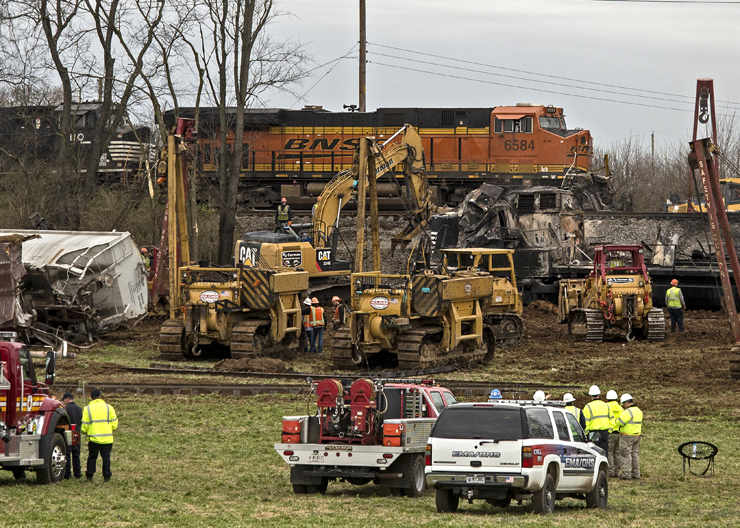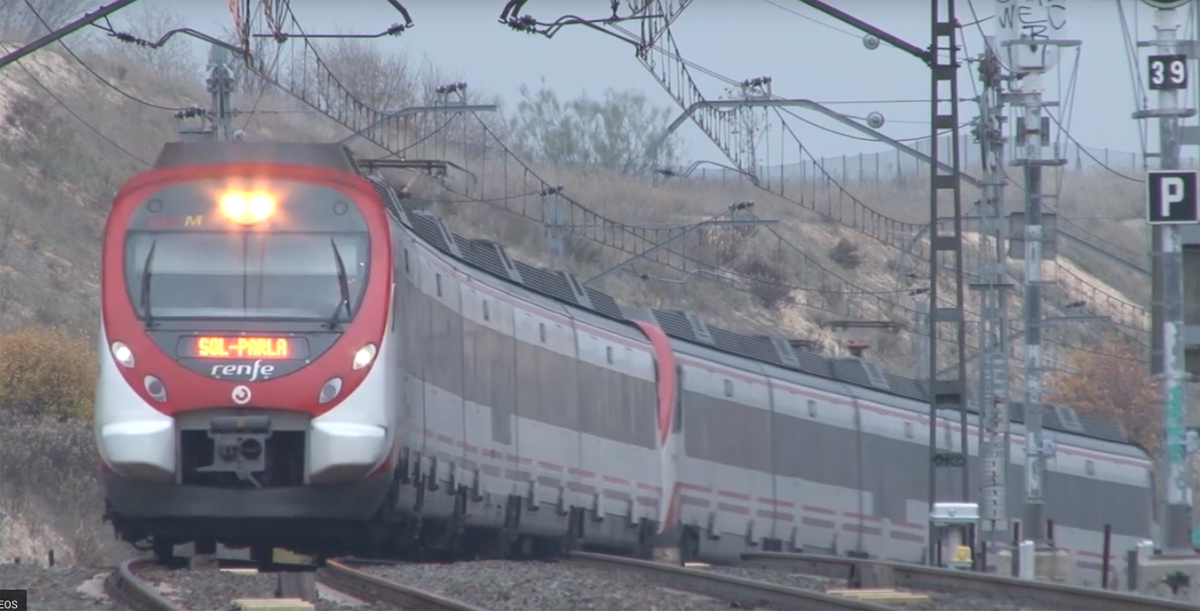John Risch, national legislative director for the SMART Transportation Division, says he believes the lawsuit against the two railroaders will never succeed and if it did it would set a dangerous precedent.
NS filed a lawsuit earlier this month in U.S. District Court for the Eastern District of Kentucky alleging that Engineer Kevin Tobergte and Conductor Andrew Hall failed to stop at a signal near Georgetown, Ky., on March 18. That failure, NS alleges, put the men’s train in the path of another causing a collision. Four employees were hurt in the wreck.
In years past, a crew that failed to stop at a signal and caused a major wreck would probably lose their jobs. But Risch says suing the crew is a bridge too far.
“It’s outrageous behavior by Norfolk Southern,” Risch tells Trains News Wire. “They’re going to have to start paying railroaders $1 million or $2 million annually so they can pay for when their employer sues them.”
Risch says a railroad suing an employee over a mistake at work is not unheard of, but as far as he knows, none of those cases have ever succeeded.
Dennis R. Pierce, president of the Brotherhood of Locomotive Engineers and Trainmen, wrote in February that the increase of lawsuits and criminal cases against railroaders is concerning to him. Three former Montreal Maine & Atlantic Railway employees stood trial recently for their involvement in the fatal 2013 oil train disaster in Quebec and an Amtrak conductor was charged after a fatal derailment in Philadelphia in 2015.
“In the wake of recent dramatic and highly visible railroad accidents in the United States and Canada, there has been a trend to criminalize railroad workers and prosecute them as the sole cause of these tragedies,” Pierce wrote.
Mike Blaszak, an attorney who specializes in railroad legal issues and is a long-time Trains correspondent, says lawsuits against railroaders are rare for a number of reasons.
“The reasons you don’t see such suits very often are that employees generally do not have sufficient assets to offset the cost of the suit, they can declare bankruptcy to avoid any judgment, and such suits can have a devastating impact on the morale of the employer’s other employees,” Blaszak says.
Risch says relations between management and labor has always been tense in the railroad industry but that it seems to have gotten worse in recent years. He says he hopes that changes in the future.
“I want an environment where railroaders are not living in fear of losing their jobs or worst getting sued and being forced into bankruptcy,” he says.














“… [A]n Amtrak conductor was charged after a fatal derailment in Philadelphia in 2015”?
Do I understand right that a writer in Trains magazine does not comprehend or recognize the difference between a conductor and a locomotive engineer?
Where are the editors?
Are they asleep at a proverbial switch?
Should Kalmbach send that author to a good 101-level course in railroading?
Jerry…controlling a simple drone compared to a 10,000 ton train…lol…no logic…as for Unions…our country is safer and quality of life for working people is the best in the world.
Very bad precedent
Mr. Risch should know how the FELA law works. The purpose of the suit is not to recover but to fix where the negligence lays to prevent the employees for suing for their injuries under FELA.
In both professional and personal matters, “fear” has been a constant in my life. It has been my experience that “fear” boils down to two choices. 1. Face Everything And Recover or 2. False Evidence Appearing Real. Perhaps both scenarios are in play regarding the NS situation. For the Thoroughbred’s continued success as a business, employer, and asset to the U.S. economy, facing “fear” may prove useful.
Was the NS filing in response to an employee claim against the railroad or is NS making the claim against the employees as the first one to the courthouse?
Of course the next step is for these employees to file for damages from their injuries.
Personally I would be making the point to a jury and judge the working conditions that led to the issue. Lack of proper rest caused by a hostile work environment.
Al….”profession” might be a bit of a stretch here. Any shyster that would try this is not very professional or ethical.
Is this the same Norfolk Southern that didn’t want to have to deal with the toilets on their locomotives, so they required employees to place a plastic potty bag over the toilet seat? Train crews began labeling the railroad the “Nazi Southern.” Running a railroad using adversarial relationships between employees and management has never worked well and won’t here.
A fertile new field for the over-populated legal profession?
Some better lawyers could teach NS a thing or two about employment law. Basic business ethics. though, can’t be taught. You need to have that going in. You either run a decent business, or, like NS, you don’t.
If the U.S. military can hit the Taliban with a remote controlled drone from 7300 miles away, controlling a train from a dispatching station a few hundred miles away should not be a problem. Automate over-the-line trains and that would alleviate this particular issue, along with a host of others, such as inadequate re-crews, fatigue, call-outs, sick days, vacations, strikes, insurance benefits, and labor costs. It would also bust the Union’s balls, not that they do much more these days than take dues and issue press releases when it suits them.
I think it is absolutely dumb of NS pulling such a stunt. If the crew violated safety law, then they should be properly terminated. But, if NS management wants to intimate crews “into shape” (and seriously hamper morale) then let the &$*# hit the fan and watch NS employee turnover skyrocket. I think it would be justice for the trainmen if the unions could get these lawsuits tossed out.